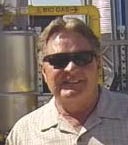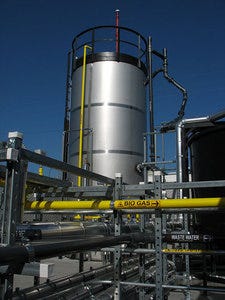Converting Brewery Waste to Energy in California
Pure Energy Group (PEG), a Park City, Utah-based renewable energy company that engineers, designs and builds anaerobic digestion systems, opened a waste-to-energy facility at Devil’s Canyon Brewery in San Carlos, Calif., in May 2014. It is the first project of its kind to be permitted and operational in an urban setting. The facility converts brewery waste, including spent grains and more, into bio-gas to run the brewery, according to PEG.
Last month, Devil’s Canyon Brewery was awarded “Business of the Year” from the San Carlos Chamber of Commerce and the City of San Carlos for its sustainable business practices—including the company’s “history of intercepting materials destined for the local landfill and using them internally or ensuring they go to another business or group that can benefit by re-utilizing them,” according to a release from the brewery.
 Brandon Julian, CEO of PEG, sat down with Waste360 to discuss the facility’s successes and challenges within its first year.
Brandon Julian, CEO of PEG, sat down with Waste360 to discuss the facility’s successes and challenges within its first year.
Waste360: Explain the process of having a waste-to-energy plant at a brewery? How does it work?
Brandon Julian: The brewery uses grain, such as barley, malt and hops to produce beer. What is left over from the brewing process is spent brewers grain (SPG). This SPG is a great feedstock for an anaerobic digester. We at PEG use this feedstock to produce bio-gas through our state-of-the-art induced bed reactor (IBR). The bio-gas produced from the IBR will be sent back to brewery to offset natural gas consumption.
(PEG’s IBR) system can process incoming waste streams up to 25 percent solids, and has no mixing motors. The result is a compact—25 to 50 percent of the standard footprint—modular and scalable system that is simple to operate, maintain and that can be easily incorporated into existing facilities. Depending on the size of the unit, PEG IBRs can convert from 1,200 to 50,000 tons a year of organic waste into as much as two to three mega-watts of co-generated heat and power.
Waste360: What are some of the successes you've seen since launching almost a year ago at Devil's Canyon Brewery?
Brandon Julian: The city of San Carlos, Calif., has been instrumental in approving this project and has endorsed our approach in providing sustainability to the brewery and the brewery industry in general. In fact, Devil’s Canyon recently received the 2015 sustainability award from San Mateo County, Calif., in part due to the IBR digester from PEG. The success of this project has leveraged other business development opportunities for PEG in the U.S. and in the United Kingdom (UK).
Waste360: What are the cost-saving, environmental and waste-reduction benefits the Devil's Canyon Brewery facility has experienced?
 Brandon Julian: PEG is working on solutions to provide Devil’s Canyon with a reduction in natural gas consumption. With Devil’s Canyon brewery being recognized with sustainability awards, which PEG played a part of, this has also given us recognition as a sustainable partner with the brewery and as an anaerobic digester provider. We are working on new and intuitive ideas to enhance the co-benefits from our facility that will aid in waste reduction, recycling and sustainability to better the brewery industry and PEG as a whole.
Brandon Julian: PEG is working on solutions to provide Devil’s Canyon with a reduction in natural gas consumption. With Devil’s Canyon brewery being recognized with sustainability awards, which PEG played a part of, this has also given us recognition as a sustainable partner with the brewery and as an anaerobic digester provider. We are working on new and intuitive ideas to enhance the co-benefits from our facility that will aid in waste reduction, recycling and sustainability to better the brewery industry and PEG as a whole.
The Devil’s Canyon … system is in its final stage of being fully optimized and commissioned. The facility has one 6,500 gallon reactor with the capacity to process 2 million pounds of spent grains per year. The facility is estimated to generate bio-gas equivalent to approximately 230,000 kWh of electricity per year, that is enough to offset approximately 15 homes per year, which is also the equivalent of eliminating around 50 cars off the road or 26,000 diesel gallon equivalents (DGE).
Waste360: What hurdles have you overcome at the Devil’s Canyon Brewery facility?
Brandon Julian: With typical startups, there are always some unforeseen bugs to be worked out. We had a few as well but we have worked through those and are in a good operational position now.
Waste360: Any plans to expand to other breweries or has PEG already done so?
Brandon Julian: Yes, our business development plans include advancing this technology into other breweries in the San Francisco Bay area, other locations elsewhere in California and across North America. The robust growth in the brewery industry is promising for PEG.
Waste360: Any projects in the works at other unique businesses, like the brewery?
Brandon Julian: Yes, we have a project in development in the U.K. that adds tremendous value to the organics recycling attributes of PEG. There are several other commercial enterprises, aside from the brewing industry, that would benefit from PEG’s technology and we are actively seeking projects in the following markets; food and beverage processors; cheese/dairy producers, distillers and wineries, grocery distribution centers, fast food distribution centers, fruit/vegetable packagers, meat/poultry processors, and commercial/institutional facilities (hotels, resorts, restaurants, schools/campuses, hospitals, institutional cafeterias, military bases).
We are hopeful that sharing good news like this can spread in the industry to grow the anaerobic digesters business into the prosperous future, as we see it. In addition, our IBR technology has a unique fit in this industry, as our foot print and capital cost are often substantially less than conventional anaerobic digesters.
About the Author
You May Also Like


